Key takeaways:
- Homelessness charities should focus on long-term solutions by addressing root causes, such as providing job training and mental health support.
- Advocacy plays a crucial role in amplifying the voices of those experiencing homelessness and can lead to community support and legislative changes.
- Effective strategies for advocacy include storytelling to connect with the community, collaboration with local businesses, and pushing for policy changes.
- Measuring success in advocacy involves both quantitative metrics and qualitative stories that highlight the impact on individuals’ lives.

Understanding homelessness charity goals
Understanding the goals of homelessness charities is essential in grasping how they can create lasting change in people’s lives. I often reflect on the stories I’ve encountered—like that of a single mother who lost her home due to unforeseen circumstances. Her determination to rebuild her life, supported by a local charity, emphasizes the profound impact that targeted assistance can have on individuals facing hardship.
The primary aim of these organizations often revolves around not just providing short-term relief, like food or temporary shelter, but also addressing the root causes of homelessness. I think about how crucial it is for charities to offer job training programs or mental health support, creating pathways to stability. What if every charity focused on empowerment instead of mere survival? That’s the kind of transformation that can chart a course to genuine recovery.
In my experience, understanding these goals helps us see the bigger picture. When we engage with these charities, we contribute not only to immediate needs but also to long-term solutions. I once volunteered at an outreach event where we provided resources and support. Seeing individuals light up with hope as they received not just food, but guidance for a brighter future, truly underscored the importance of holistic approaches in this field.
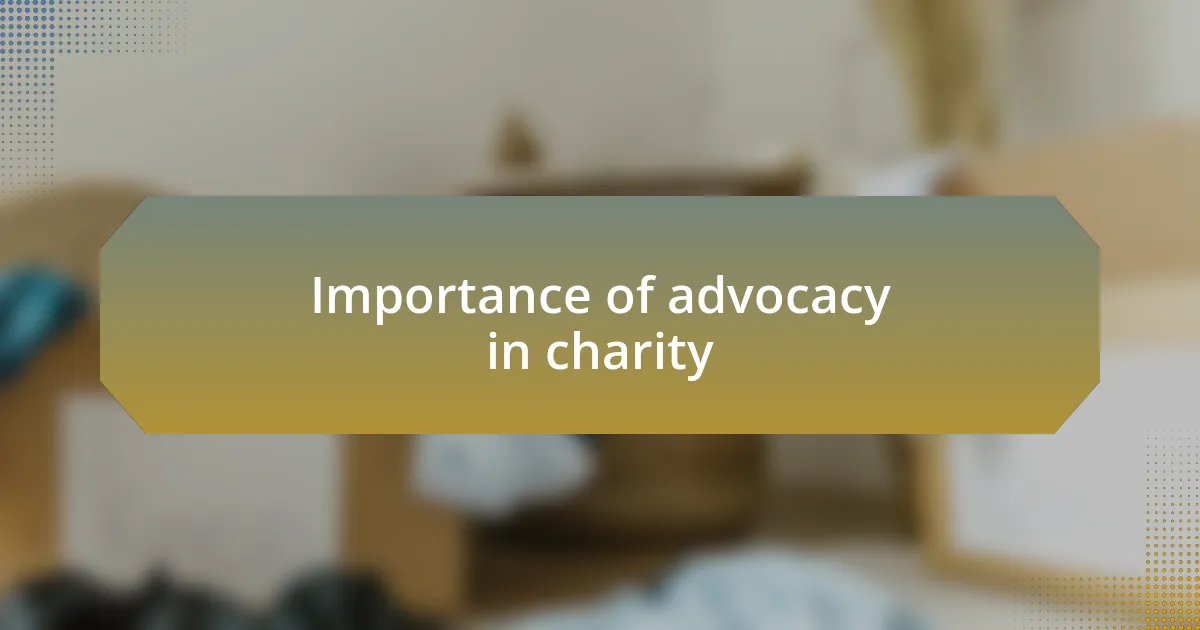
Importance of advocacy in charity
Advocacy in charity is crucial because it amplifies the voices of those we aim to help. When I think about the individuals experiencing homelessness, I remember a time when I listened to a man share his story of hardship at a town hall meeting. It was eye-opening to hear how advocacy initiatives—like improved housing policies—could transform lives. Aren’t we all deserving of a chance at a stable future?
Moreover, advocacy raises awareness and mobilizes community support, making it possible for charities to expand their reach. I recall organizing a campaign for a local charity that highlighted the invisible struggles people face on the streets. The outpouring of community support was overwhelming, and it reinforced my belief that informed advocacy can bring people together to drive real change. When we ignite conversation, we pave the way for legislative reforms that can address systemic issues linked to homelessness.
In my experience, being an advocate means continuously pushing for solutions that go beyond immediate aid. I once had a conversation with a social worker who passionately spoke about the need for policy changes to provide affordable housing. Hearing her conviction made me realize that advocacy is about building a movement, not just offering assistance—it’s about empowering individuals to reclaim their lives and dignity. How powerful is it to know that together, we can foster a society where everyone has a place to call home?
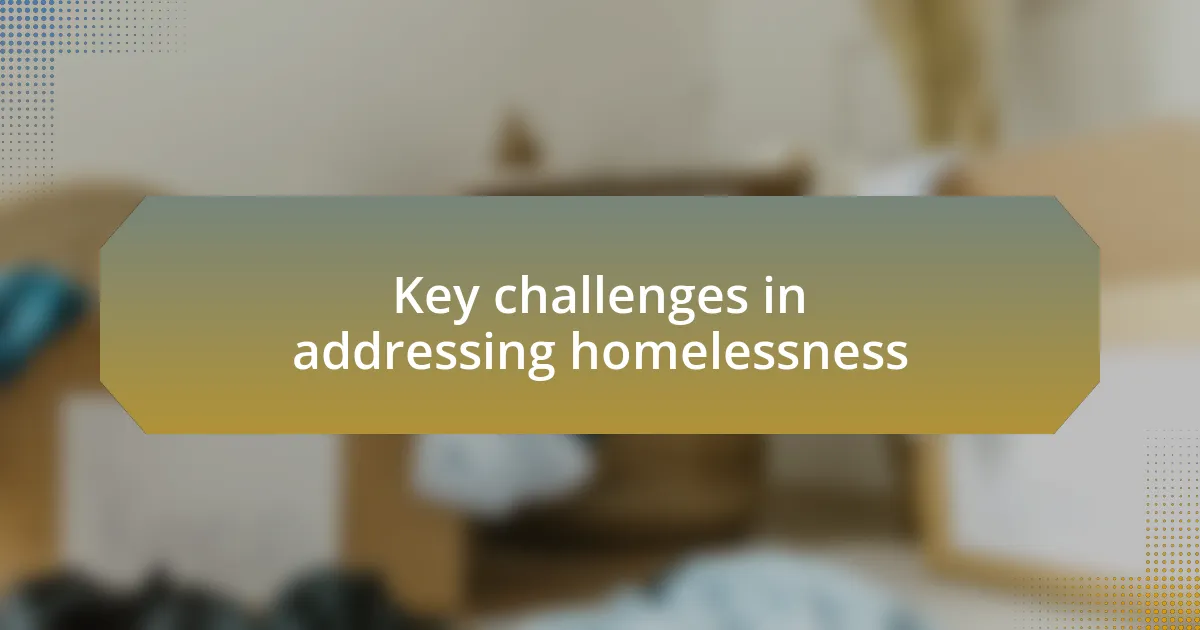
Key challenges in addressing homelessness
Addressing homelessness comes with significant challenges, one of which is the stigma that surrounds it. I remember attending a community meeting where a participant expressed doubts about providing support because they believed many individuals choose to be homeless. It struck me how misperceptions can create barriers to empathy and support. How do we change hearts and minds when misconceptions linger?
Another key challenge is the scarcity of affordable housing options. I once learned about a family forced to live in their car after losing their home due to unexpected medical expenses. This story brought to light how economic instability profoundly affects housing security. Isn’t it disheartening to realize that a single setback can lead someone down a path of instability?
Finally, coordinated services can often be fragmented. I volunteered at a shelter where many residents required different types of support, from mental health services to job training. However, these resources weren’t always easily accessible, leaving many without the help they desperately need. Isn’t it frustrating to see individuals yearning for change but not knowing where to start? By recognizing these complexities, we can tailor our advocacy efforts to foster effective and compassionate solutions.
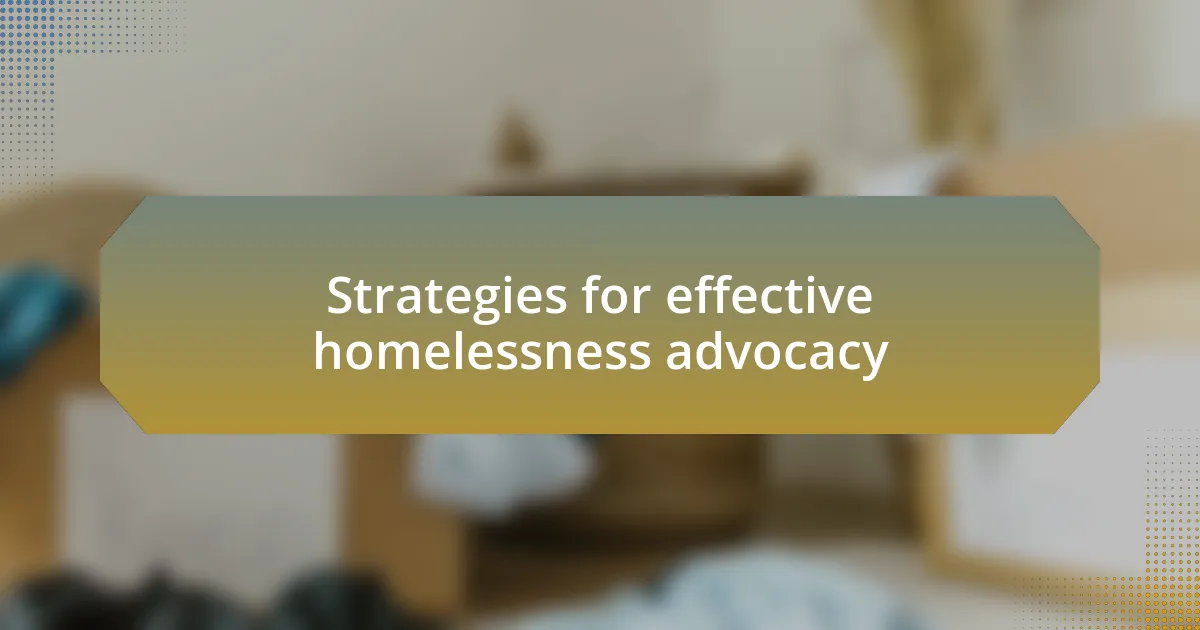
Strategies for effective homelessness advocacy
One effective strategy for homelessness advocacy is to leverage storytelling. I recall a particular event where a formerly homeless individual shared their journey with a room full of community members. The raw honesty and vulnerability in their narrative created a powerful connection that statistics alone couldn’t achieve. Isn’t it remarkable how a personal story can shift perspectives and inspire action in ways that data and charts simply cannot?
Another important approach is collaboration with local businesses and organizations. During a project I was involved with, our team partnered with a local café to provide job training for the homeless. The success of that initiative revealed an unexpected bond: the community rallied around the cause, proving that when we pool resources and ideas, we can create sustainable change. How can we harness the collective strength of our communities to combat homelessness more effectively?
Lastly, advocating for policy changes at the local and state levels can lead to significant impact. I’ve often found myself in meetings with local officials, pushing for increased funding for housing programs. It’s disheartening to witness hesitation, but every conversation plants a seed of awareness. Wouldn’t it be empowering if everyone took the time to voice their concerns about homelessness to those who have the power to facilitate change?
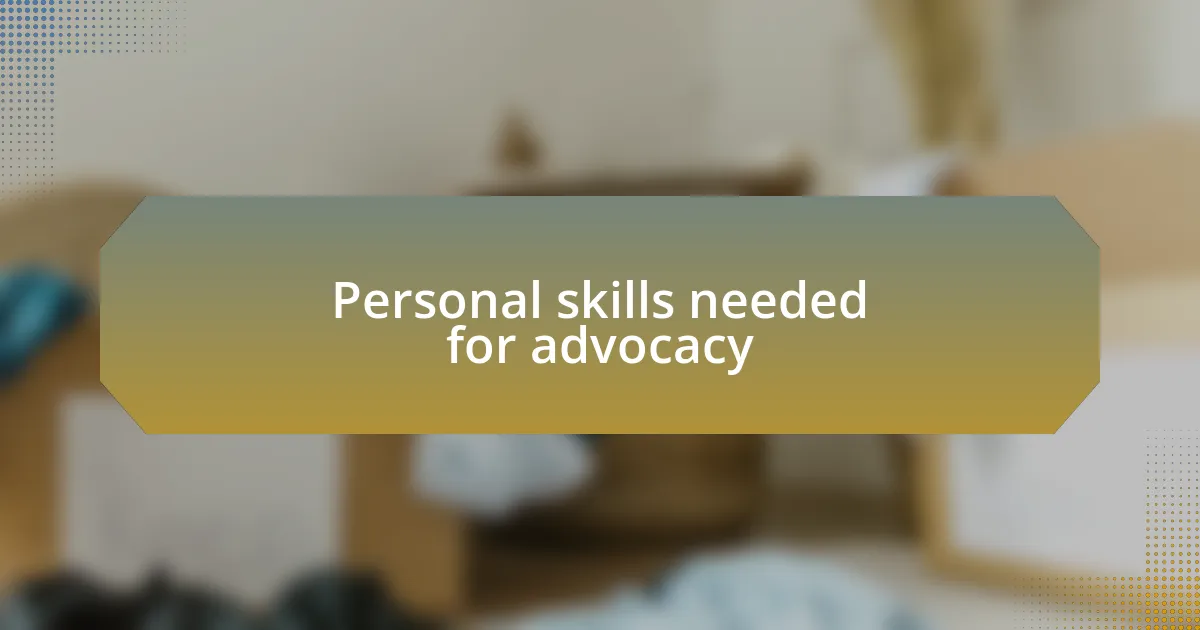
Personal skills needed for advocacy
Advocacy requires a combination of empathy and active listening. I remember attending a community forum where I listened to the stories of several individuals currently experiencing homelessness. Their experiences highlighted the importance of understanding their unique struggles. Have you ever paused to truly listen to someone else’s story? That insight can be invaluable in shaping effective advocacy efforts.
Another crucial skill is resilience. I vividly recall a moment when a proposed policy I championed was shot down due to lack of support. It felt discouraging, yet I realized that persistence is key in this field. Isn’t it fascinating how setbacks can become stepping stones if we choose to view them that way? Each challenge teaches us something new and drives us to refine our approach.
Moreover, effective communication is essential. I once prepared a presentation filled with data about homelessness, but the real breakthrough came when I distilled that information into relatable anecdotes. This experience taught me the power of clarity and relatability in getting our message across. How often do we forget that compelling narratives can make complex issues more accessible? By engaging our audience, we can motivate them to join our cause.
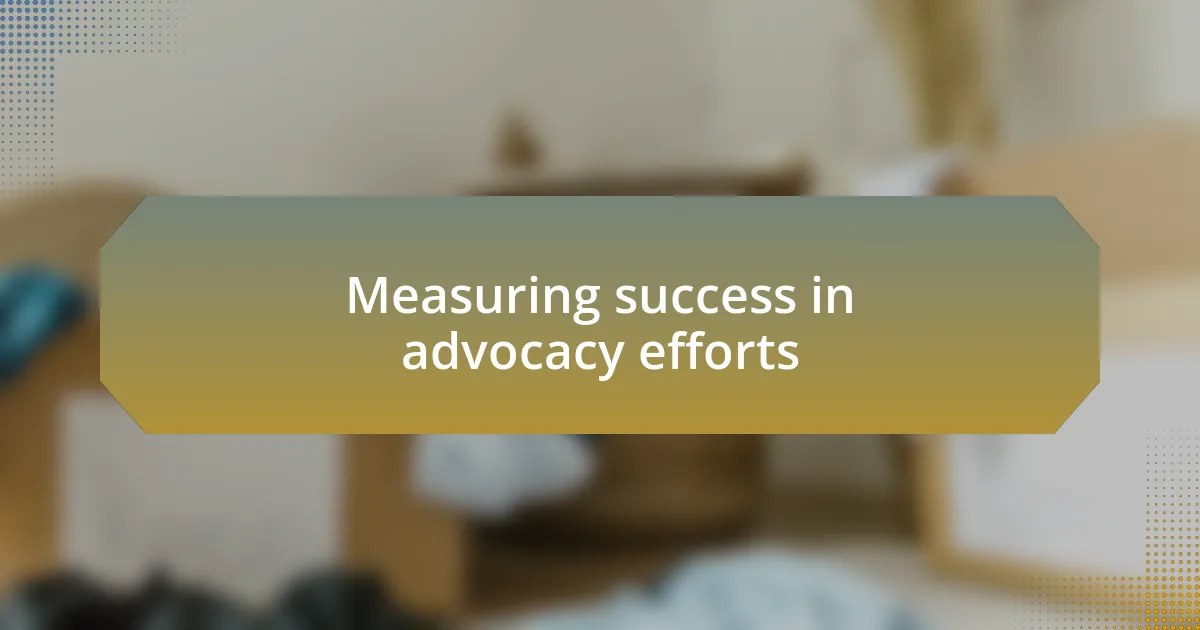
Measuring success in advocacy efforts
Measuring success in advocacy efforts can be a nuanced process. I once participated in a campaign aiming to increase funding for shelters, and while we didn’t secure the full amount initially, we did notice an uptick in community engagement. Did you know that quantifiable metrics, like the number of new volunteers or donations generated, can really capture the heart of our progress? It’s about recognizing the small victories along the way.
Another way to gauge success is through the stories we gather from those we aim to help. I remember receiving heartfelt letters from individuals who found shelter and support through our efforts. These poignant messages served not only as feedback but as a powerful reminder of the lives we impact. Have you ever thought about how qualitative data, those tangible human stories, can sometimes be more compelling than statistics? These narratives are essential for demonstrating real change.
Lastly, assessing our influence on policy is crucial. After a local legislation passed to extend housing assistance, I felt a profound sense of accomplishment. Yet, it raised an important question: How do we track long-term impact beyond immediate policy results? Engaging with community members post-policy implementation can shed light on how effectively these changes translate into improved lives. Isn’t it fascinating how advocacy can evolve when we continually measure and reflect on our efforts?
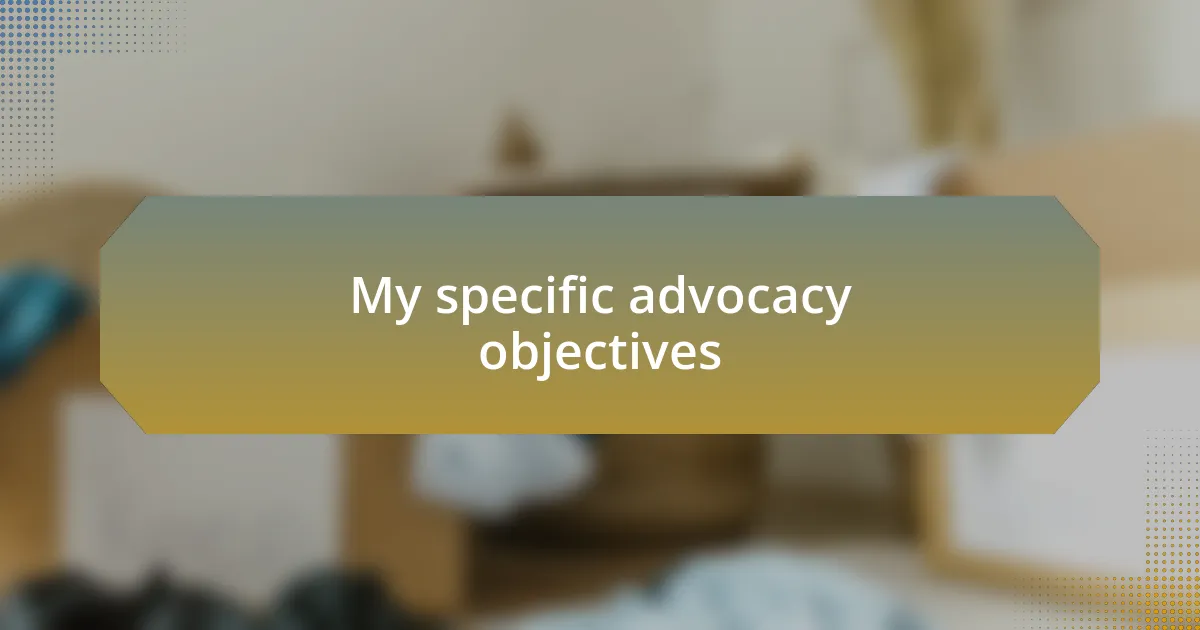
My specific advocacy objectives
When I think about my specific advocacy objectives, I see clear goals that drive my passion for change. One objective is to enhance access to mental health resources for those experiencing homelessness. I vividly recall a conversation with a young man who shared how therapy sessions transformed his outlook on life. Isn’t it eye-opening to realize how vital mental health support can be when people are trying to rebuild their lives?
I also strive to foster partnerships with local businesses to create job training programs. A few months ago, I attended a meeting with several local business owners who were eager to contribute but unsure how. We brainstormed ideas on providing internships and skill-building workshops. The excitement in the room was palpable. Have you ever seen how collaboration can turn a shared vision into a tangible reality?
Finally, I aim to advocate for the expansion of affordable housing initiatives in our community. I remember when I met a family living in their car, desperate for stable housing. Their struggles fueled my determination to push for legislation that supports affordable housing projects. Isn’t it compelling how personal stories like this can ignite a fire within us to act?